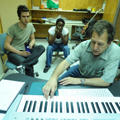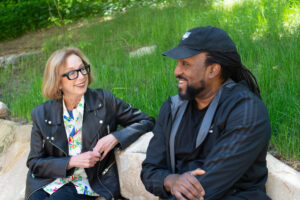Nate von Zumwalt
There is a visceral element involved in recognizing a great film score. Too often, as moviegoers, we fail to identify music as the component responsible for striking a chord within us. It’s these “textures and emotional qualities,” as Film Music Program director Peter Golub describes it, which elevate a film to a level that moves us.
Each summer, Sundance Institute holds two Labs for composers, one focusing on feature film, the other on documentaries. Armed with a team of seasoned advisors, the labs welcome both veteran and aspiring composers—some with no experience in film music—and pairs them with documentary and feature filmmakers in the mountains of Utah to work on film scores.
The Film Music Program also returns to Utah each January to host events catered towards the music community, including a composers roundtable discussion and live performances at the Sundance Film Festival. It all encourages an ever-growing film music family, and more than a decade after the Program’s inception, Golub and his team continue to channel their music to the big screen.
Generally speaking, what role do you see music playing in film?
Music has an ability to be narrative, to tell a story. I think cartoon music is the most obvious example of that, where the music is illustrating the running steps, and going up a ladder, and something falling down…the music is called Mickey Mouse. It’s where you just illustrate and follow the story as it’s happening in the colors and gestures of the music. Nowadays, most filmmakers go for something that is less manipulative. Just as the stories are more ambiguous, music has analogously become less manipulative.
What makes a particular musical piece good for film?
There is a quality that is hard to pin down, but some music sticks to the picture, and for some, the film is like Teflon, and everything just falls right off it. There is something about certain music that works with a picture and certain kinds of movies. It has to do with textures and emotional qualities. It’s something we’re looking for. Sometimes we hear really interesting music, but you can tell it won’t be for a movie.
What gives a composer a knack for film music?
There are some temperamental factors and some practical ones. You have to be able to write quickly, you have to be able to take notes and adapt your music to the needs of a film. I know some composers who wouldn’t think of changing anything they composed. A film composer needs a thick skin to deal with all the criticisms and notes. You can’t be too ego-involved, and you need to be able to realize that it’s not just about the music.
You’ve been leading the Film Music Program for 12 years. What changes have you witnessed in the field of film music over the last decade?
I think there’s a lot more music in films today. It’s rare to see a film these days with very little music. No Country for Old Men got a lot of attention in part because there was strikingly little music in it, and even that could have been confused for a refrigerator hum. Usually I think there’s too much.
It seems like with waning attention spans and the need to always be cutting, directors lean on music. I’m constantly saying, ‘You don’t really need music here, this scene’s working great, it’s just going to distract.’ I’m not arguing for not having music in film. I’m just saying that when you see a movie from 25 years ago you think, ‘Wow, if that movie were made today there would be wall-to-wall music, and not for the better.’
What is your idea of music working perfectly in a film?
I’ve been looking at a lot of John Williams lately and I don’t think you can beat E.T., or Jurassic Park, or Schindler’s List.
You compose for films yourself, including your recent score for Countdown to Zero which is playing in theaters this summer. How do you decide what films to take on?
It’s hard to write your best music for something that’s just okay. The really meaty projects inspire something that you can reach for and hopefully attain. It has to speak to you on some level. There is a suitability factor, and something that engages you.
As a practicing artist, what do you take away from working at the Composers Labs each year?
There are certain themes that occur year after year. One of them is to not overwrite. Composers sometimes want to show that they can do all these things, but it’s really about serving the film and leaving room for the movie, and accompanying the movie in a way that doesn’t lead. It’s also very much about collaborating, learning to listen to what the director is saying, to interpret what they’re saying. One of the points of the Lab is that people learn to approach this without anxiety and trepidation.
Do you have any tips to pass on to aspiring composers?
When budgeting for film, music is the last big thing to be done, so some times it doesn’t get thought of until the very end. They budget “x” amount for music, and it’s probably not very much. And then as production is going on, they keep robbing from the music budget. At the end of the day, what was probably too little to begin with is now whittled down to 30 percent of what it was. That’s a tip for filmmakers, make a true budget for music and leave it there. Just because it’s the last thing doesn’t mean you’re not going to need it.




